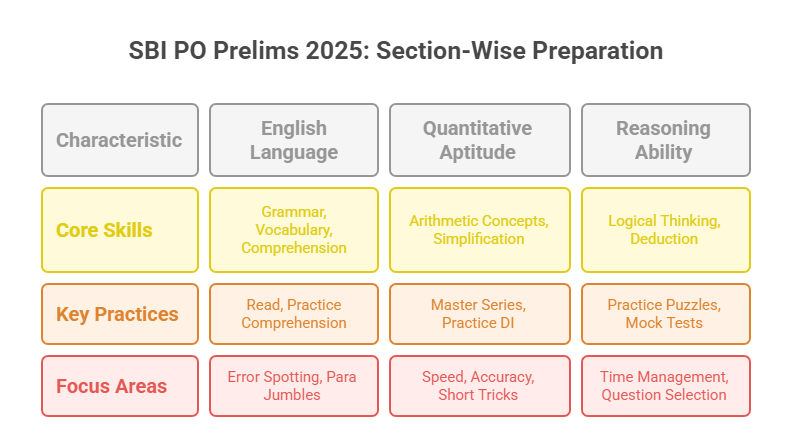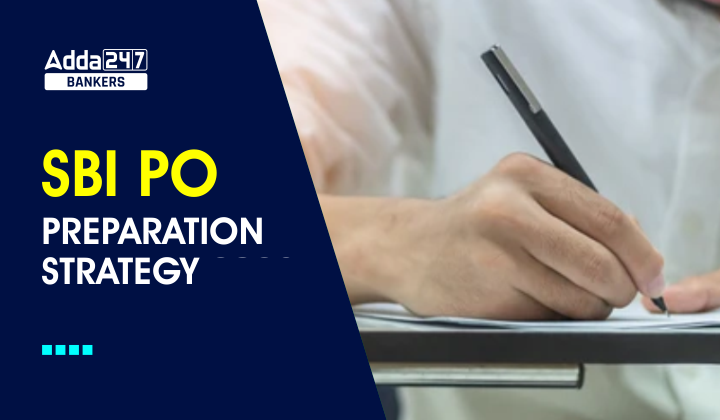With just a few days left for the SBI PO 2025 Preliminary Exam, candidates must shift their focus to strategic preparation. These final 20 days are crucial for improving speed, accuracy, and question selection. A well-planned study schedule, regular practice through mocks, and timely revision can make a significant difference in your final performance. This article provides a practical last-minute strategy and a date-wise plan to help you stay focused and exam-ready.
SBI PO Preparation Tips 2025
The SBI PO Prelims exam is officially scheduled for 02, 04, and 05 August 2025. With only 20 days left, aspirants must now prioritise high-weightage topics, take sectional tests, and analyse previous year questions. Daily goals and consistent performance reviews will help you stay on track and boost your confidence for the actual exam.
| Last 20 Days Strategy | |
| Date | Focus Area |
| 19 July | All India Mock (Full Length) |
| 20 July | will update soon |
| 21 July | will update soon |
| 22 July | will update soon |
| 23 July | will update soon |
| 24 July | will update soon |
| 25 July | will update soon |
| 26 July | will update soon |
| 27 July | will update soon |
| 28 July | will update soon |
| 29 July | will update soon |
| 30 July | will update soon |
| 31 July | will update soon |
| 01 August | will update soon |
| 02 August | will update soon |
| 03 August | will update soon |
| 04 August | will update soon |
SBI PO Preparation Strategy 2025
The SBI PO selection process consists of three crucial stages, and candidates must clear each stage by securing the minimum cut-off to move forward in the recruitment process. While every aspirant has a unique way of preparing, certain strategic techniques can significantly enhance study effectiveness. To help you streamline your preparation and boost your chances of success, we have compiled a well-structured SBI PO 2025 Preparation Strategy along with essential tips and tricks.
Also Read, SBI PO Prelims Exam Date 2025
- Understand the Syllabus: The syllabus acts as the backbone for any competitive exam preparation. For SBI PO, candidates should be acquainted with the SBI PO Syllabus for Prelims and Mains. The subjects covered under the SBI PO Syllabus are English Language, Quantitative Aptitude, Reasoning Ability, General/Economy/Banking Awareness, and Computer Aptitude.
- Study Material: Access the best SBI PO Study Material according to the requirements, such as online classes, video courses, books, mock tests, etc.
- Time Management: To qualify for the SBI PO Exam, candidates need to follow a strict schedule distributing equal time to each of the subjects asked in the SBI PO Prelims and Mains Exam.
- Consistency: Aspirants know that cracking SBI PO is not easy, so one should be consistent in their preparation as regular study sessions are very important. Dedicating a few hours of the day can also help to achieve the desired target.
- Mock Tests: Without practice, perfection cannot be achieved so attempting mock tests regularly must be included in the schedule. Mock tests help to assess the progress and identify the areas for improvement.
- Revision: As candidates learn new things each day, the concepts get piled up. So it is important to have proper revision at regular intervals.
- Proper Care of Health: Along with preparation, candidates also need to take proper care of their health. They can do so by doing yoga, meditation, eating a proper diet, and having regular sleep.
- Understand the Exam Pattern: Aspirants preparing for SBI PO must be familiar with the exam pattern as through it candidates get to know the complete structure including the sections, number of questions, maximum marks, and time duration.
Section-Wise Preparation Strategy for SBI PO Prelims 2025
The Prelims stage consists of three major sections: English Language, Quantitative Aptitude, and Reasoning Ability. The Phase I exam is expected to be conducted in July/August 2025. Here’s how to approach each section of prelims:

English Language (40 Questions, 40 Marks, 20 Minutes)
- Strengthen grammar basics to avoid errors in error spotting and sentence improvement.
- Read editorials and newspapers daily to improve vocabulary and comprehension skills.
- Practice at least 2–3 reading comprehension sets every week.
- Focus on cloze tests, para jumbles, and fill-in-the-blanks for variety.
Quantitative Aptitude (30 Questions, 30 Marks, 20 Minutes)
- Revise fundamental concepts of arithmetic topics like percentages, profit & loss, and time-speed-distance.
- Master simplification, approximation, and number series for quick scoring.
- Practice data interpretation (DI) sets regularly using mock tests and past year papers.
- Focus on speed and accuracy by using short tricks and maintaining a formula notebook.
Reasoning Ability (30 Questions, 30 Marks, 20 Minutes)
- Practice puzzles and seating arrangement questions daily to develop logical thinking.
- Strengthen basic topics like syllogism, inequalities, blood relations, and coding-decoding.
- Use mock tests and quizzes to simulate exam pressure and improve time management.
- Learn to identify easy questions first and attempt them to maximize your score.
Section Wise Preparation Strategy for SBI PO Mains 2025
As the SBI PO Mains Exam draws nearer, candidates should intensify their focus on the core sections that define success at this stage Reasoning & Computer Aptitude, Data Analysis & Interpretation, General/Economy/Banking Awareness, and English Language. Since the Mains round is more advanced and competitive, it’s crucial for aspirants to upgrade their preparation strategy accordingly. Moreover, with the Descriptive Test and Interview round following the Mains, aspirants must adopt a targeted and section-wise approach to preparation to ensure they are fully ready to tackle each part of the exam with confidence and efficiency.
Reasoning & Computer Aptitude Preparation Strategy (40 Questions, 60 Marks, 50 Minutes)
- Weightage & Importance: This section carries 60 marks and includes advanced-level reasoning and computer aptitude topics.
- Key Topics: High-level Puzzles & Seating Arrangements, Data Sufficiency, Input-Output, Logical Reasoning, Syllogism & Coded Inequalities, Machine Input-Output, and Computer Aptitude (Networking, OS, MS Office, Cybersecurity).
- Preparation Tips: Strengthen basic concepts, practice mains-level questions, attempt full-length mock tests, analyze previous year papers, and use online quizzes & study materials for effective revision.
- Strategy to Score Maximum Marks: Focus on accuracy, time management, and consistent practice with mock tests, quizzes, and topic-wise tests to develop problem-solving speed.
Data Analysis & Interpretation (30 Questions, 60 Marks, 45 Minutes)
- Strengthen Core Concepts: Build a strong foundation in arithmetic as it plays a crucial role in solving DI and Data Sufficiency questions.
- Master Calculation Speed: Practice approximation techniques, Vedic math tricks, and percentage-to-fraction conversions for quick problem-solving.
- Practice High-Level DI: Attempt a variety of DI sets, including mixed and caselet-based DI, as they form the major portion of this section.
- Focus on Data Sufficiency: Develop logical reasoning and numerical skills to determine sufficiency conditions quickly.
- Regular Mock Tests & Analysis: Attempt sectional tests and full-length mocks to improve accuracy, speed, and time management.
- Utilize Online Resources: Practice daily quizzes and topic-wise questions available on the Adda247 app for continuous improvement.
English Language (40 Questions, 20 Marks, 40 Minutes)
- Develop a Reading Habit: Read newspapers like The Hindu or The Economic Times daily to improve vocabulary and comprehension.
- Strengthen Grammar Fundamentals: Revise essential grammar rules to enhance accuracy in error detection and sentence correction.
- Practice High-Level Reading Comprehensions: Focus on inference-based and tone-based questions, as they are common in SBI PO Mains.
- Attempt Sectional Quizzes & Mock Tests: Regular practice with daily quizzes and full-length mocks will improve accuracy and time management.
- Expand Vocabulary: Maintain a word list, learn new words daily, and revise them regularly to excel in vocabulary-based questions.
General/Economy/Banking Awareness (60 Questions, 60 Marks, 45 Minutes)
Daily newspaper reading: Follow The Hindu Business Line, The Economic Times or Financial Express for the latest economic and banking news.
Pay attention to RBI and government policies: Track regular updates on repo rates, CRR, SLR, NPA and financial regulations.
Revise the last 6 months current affairs: Cover important news related to the banking sector, mergers and RBI circulars.
Practice quizzes and mock tests: Attempt daily GK quizzes and full-length tests to strengthen retention and recall.
Maintain a notes repository: Note down important banking and economic terms for quick revision before the exam.
Effective Ways to Prepare for the SBI PO Descriptive Section
The Descriptive Paper in SBI PO Mains is a 30-minute test carrying 50 marks, where candidates must attempt Letter Writing & Essay. This section evaluates writing skills, clarity of thought, and grammatical accuracy.
- Improve writing skills: Practice writing formal and informal letters and essays on banking, economy, current affairs and social issues to develop structured responses.
- Focus on clarity and Compatibility: Make sure your content is well-organized, precise and error-free, with a proper introduction, body and conclusion.
- Enhance vocabulary and grammar: Use formal language, proper sentence structure and varied vocabulary to create impressive content.
- Practice time management: Allocate 10-12 minutes for letter writing and 18-20 minutes for essay writing to complete the paper within the given time.
- Analyze previous year topics: Review previous essay and letter topics to understand the trend and practice similar topics.
- Regular typing practice: Since the exam is conducted online, it is essential to practice typing speed and accuracy for efficient time management.
Common Mistakes to Avoid During SBI PO Preparation
Preparing for the SBI PO exam isn’t just about how much you study, but also about how wisely you approach the process. Many capable aspirants stumble not because they lack knowledge, but because they fall into avoidable traps during their preparation. Here’s a perspective-driven look at mistakes that might silently derail your efforts and how to stay ahead of them.
1. Preparing Without a Roadmap: Jumping into preparation without a clear direction is like setting off on a journey with no destination. Instead of randomly picking topics, start with a structured plan outline what needs to be done each week, set monthly checkpoints, and adjust based on your progress.
2. Treating All Sections Equally When They’re Not: Every section in SBI PO holds a different level of weight and difficulty. Spending the same amount of time on basic English vocabulary and Data Interpretation doesn’t add up. Instead, prioritize based on scoring potential and your current proficiency.
3. Chasing Quantity Over Quality: Solving hundreds of questions without understanding the logic behind them might give you a sense of progress but it’s often superficial. It’s better to solve 30 questions deeply, analyze your mistakes, and understand shortcuts than blindly solving 300.
4. Avoiding What Feels Difficult: Topics like puzzles, DI sets, or para jumbles can feel intimidating. Putting them off for later or skipping them altogether. In a competition like SBI PO, every mark counts. Face the hard stuff early and often it’s the only way it becomes easier.
5. Overloading on Study Material: A common misstep is hoarding too many books, PDFs, Telegram groups, and videos leading to confusion and burnout. Choose a few trusted resources and stick to them. Mastery comes from repetition and focus, not from a messy mountain of content.
6. Neglecting Self-Evaluation: Many aspirants spend weeks preparing but rarely test themselves under real exam conditions. Regular mock tests aren’t just about practice they show you how you perform under pressure. Not analyzing these tests is like running with your eyes closed.
7. Assuming the Descriptive Test Is Easy: The descriptive paper demands structure, grammar, clarity, and typing speed. Ignoring it till the last minute can hurt your final score even if your objective paper goes well.
8. Worrying Too Much About the Competition: Comparing your pace to that of others on social media can be mentally exhausting. Everyone has their own journey. Instead of tracking others, track your growth.
| Related Posts | |
| SBI PO Syllabus | SBI PO Salary |
| SBI PO Previous Year Question Paper | |





 GA Capsule for SBI Clerk Mains 2025, Dow...
GA Capsule for SBI Clerk Mains 2025, Dow...
 The Hindu Review October 2022: Download ...
The Hindu Review October 2022: Download ...
 IB ACIO 2025 Notification PDF Out for 37...
IB ACIO 2025 Notification PDF Out for 37...


